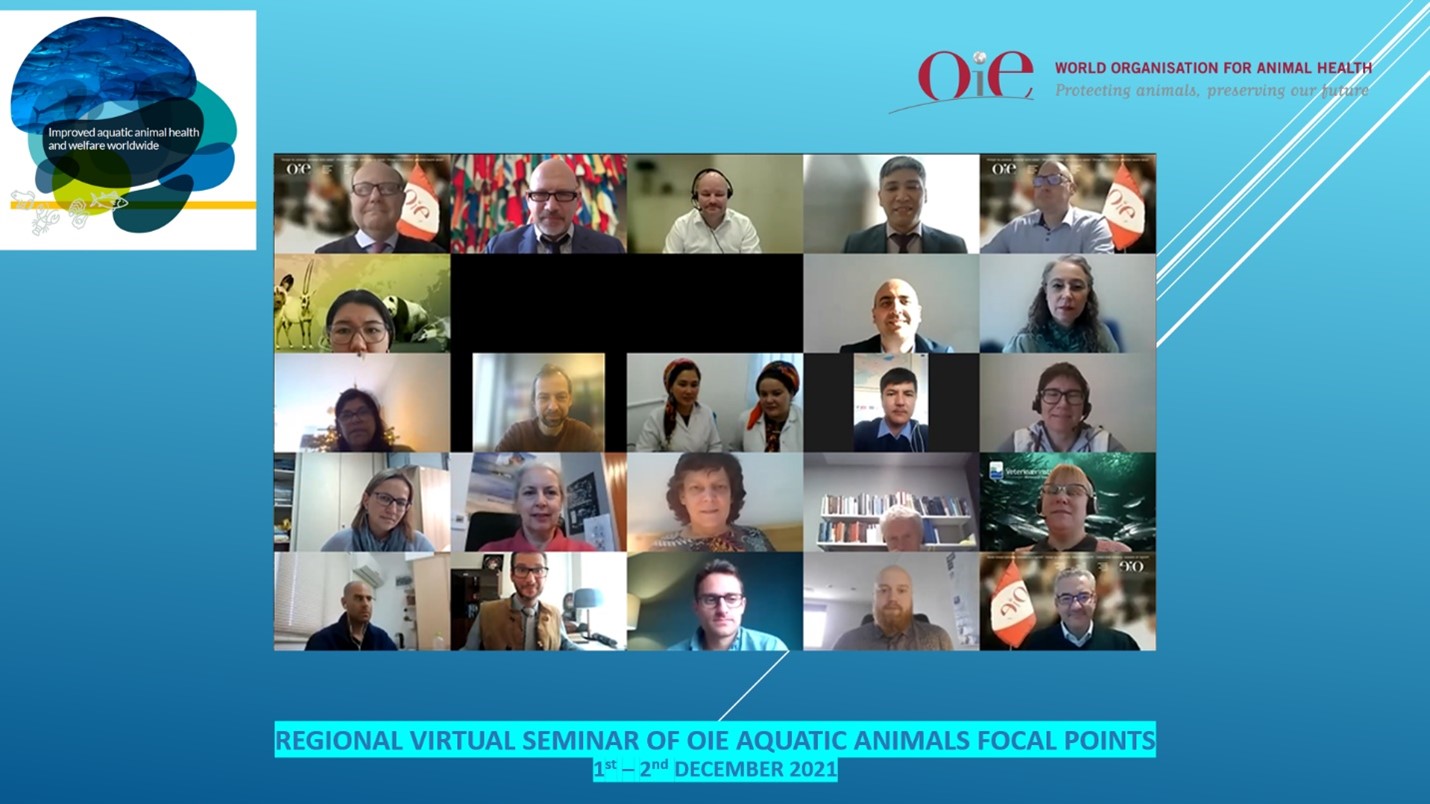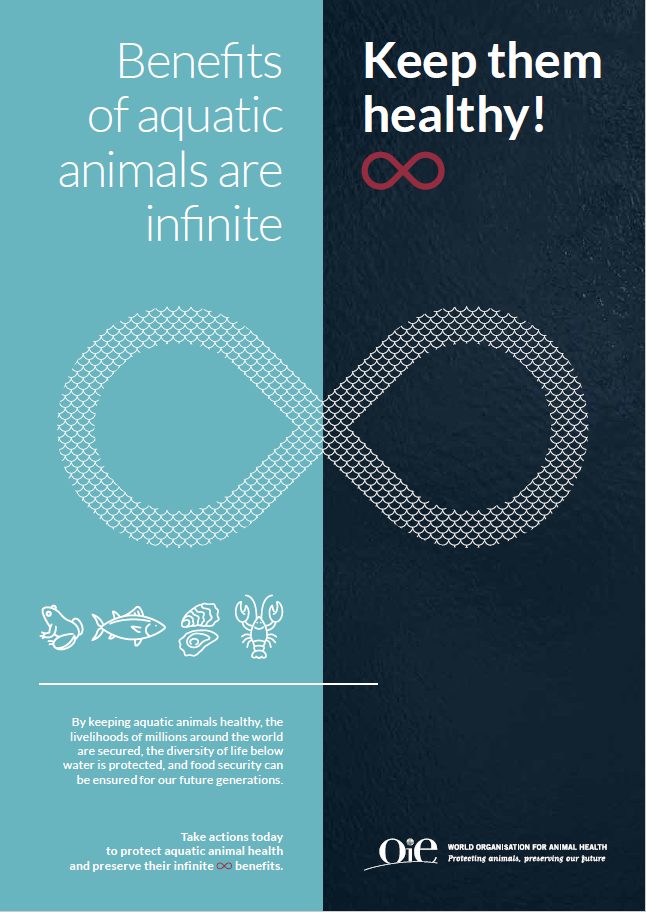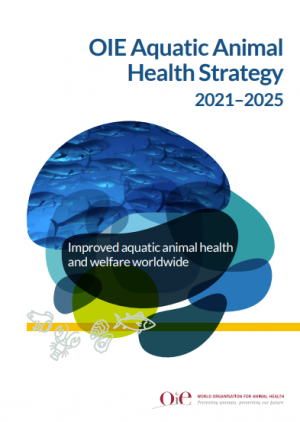The OIE Focal Points, nominated by OIE Delegates and acting under their supervision, are important mechanisms for Members to satisfy their OIE obligations and to strengthen communication and collaboration between Member Countries/Territories and the OIE. The OIE strengthens the network of OIE Focal Points through training courses and workshops at regional and sub-regional levels.
The European Regional Seminar for the OIE National Focal Points for Aquatic Animal was held virtually on 1-2 December 2021, with a total of 58 participants.
Dr Roberto Balbo, the OIE Representative in Brussels, highlighted the importance the Delegates felt way back in 2008 when it was decided to institute the figures of Focal Point for Aquatic Animal health amongst the others to support the veterinary services of the member countries in the role to fight the spread of diseases and to improve the sustainability of the sector. This is the sector that has shown the greatest growth also for the increased demand for fish protein thanks to the changes in the consumers’ diet. With the launch of the new Aquatic animal health and welfare strategy, there is a strong shift towards reaching more sustainability with an increased focus on the welfare of these animals.
The main purpose of the virtual training seminar was to increase the Focal Points’ understanding of prevention, early detection, and control of aquatic animal diseases. The importance of networking was highlighted and experience on early detection of diseases and their management was shared. An expert from Region Asia and the Pacific provided important input on aquatic animal health and welfare initiatives in this region.
Experts from the OIE Collaborating Centers on Emerging Aquatic Animal Diseases (Norway) and Epidemiology and Risk Assessment of Aquatic Animal Diseases (the United Kingdom), the Fish Health Inspectorate (the United Kingdom), and the Aquatic Animals Commission, shared values with the participants.
Three key documents were discussed between participants: the newly adopted Aquatic Code Chapter 4.1. Biosecurity for aquaculture establishments; the principles of the two new draft chapters that are under development of the Aquatic Animals Commission on Emergency Disease Preparedness and Disease Outbreak Management; and the OIE Aquatic Animal Health Strategy that was launched at the 88th OIE General Session in May 2021.
The seminar offered the participants a unique opportunity to contribute to the planning of regional and inter-regional activities on aquatic animal health and welfare with a focus on emergency disease preparedness, disease outbreak management, networking, and data collection.
The event was also an important occasion to recall Focal Points commitments and responsibilities, to support the OIE Delegates in coordinating the standard-setting process and building aquatic animal health and welfare regional networks.
Aquatic animal production and disease situation in the region
Dr Mario Latini, OIE SRR for Central Asia
Toward a future of improved aquatic animal health and welfare worldwide: OIE activities of importance to the region (incl. update on the implementation plan of the Aquatic Animal Health Strategy)
Dr Stian Johnsen, OIE HQ Standards Department
Priorities of the Aquatic Animals Commission (work on Section 4 of the Aquatic Code)
Prof. Espen Rimstad, member of the Aquatic Animals Commission
Aquatic animal health and welfare initiative in OIE Region Asia and the Pacific
Dr Jing Wang, OIE RR for Asia and the Pacific
OIE CC for Epidemiology and Risk Assessment of Aquatic Animal Diseases (Europe):
Activities and 5-year plan
Dr Mona Dverdal Jansen, Epidemiology and Risk Assessment of Aquatic Animal Disease – Europe, OIE Collaborating Centre, NVI (Norway)
How can you make use of the OIE Reference Centres?
Dr Grant Stentiford, Emerging Aquatic Animal Diseases OIE Collaborating Centre, CEFAS (UK)
Management of aquatic animal disease outbreaks in England – lessons learned
Dr Mike Gubbins, UK Fish Health Inspectorate, Cefas (UK)
Biosecurity and importance of early detection and reporting
Dr Stian Johnsen, OIE HQ Standards Department
Support on emergency disease preparedness and early detection
Dr Mona Dverdal Jansen, Epidemiology and Risk Assessment of Aquatic Animal Disease – Europe, OIE Collaborating Centre, NVI (Norway)
New technologies and concepts in emerging disease detection
Dr David Bass, Cefas (UK)
Virtual Pathology – a new platform for collaboration
Dr John Bignell, Cefas (UK)


